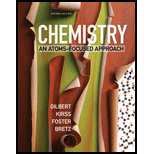
To calculate:
The equilibrium constant of the reaction
Answer to Problem 23.82QA
Solution:
The equilibrium constant of the reaction is
Explanation of Solution
1) Concept:
The logarithm of formation constant of
When we reverse any reaction, the equilibrium constant for the reverse reaction is the reciprocal of the equilibrium constant for the forward reaction.
If we add two reactions, then the equilibrium constant for the resultant reaction is the product of the equilibrium constants of those two reactions.
2) Given:
i)
ii)
3) Calculations:
The formation constants are given in logarithm form. Therefore, we have to remove the logarithm to calculate the equilibrium constant.
For
For
Reversing the first reaction, we get
Adding this to the second reaction, we get
----------------------------------------------------------------------------------------------
The equilibrium constant of the resultant reaction is the product of the two equilibrium constants:
Thus, the equilibrium constant of the resultant reaction is
Conclusion:
The equilibrium constant of the resultant reaction is determined by using the
Want to see more full solutions like this?
Chapter 23 Solutions
CHEMISTRY:ATOMS-FOCUSED..-ACCESS
 ChemistryChemistryISBN:9781305957404Author:Steven S. Zumdahl, Susan A. Zumdahl, Donald J. DeCostePublisher:Cengage Learning
ChemistryChemistryISBN:9781305957404Author:Steven S. Zumdahl, Susan A. Zumdahl, Donald J. DeCostePublisher:Cengage Learning ChemistryChemistryISBN:9781259911156Author:Raymond Chang Dr., Jason Overby ProfessorPublisher:McGraw-Hill Education
ChemistryChemistryISBN:9781259911156Author:Raymond Chang Dr., Jason Overby ProfessorPublisher:McGraw-Hill Education Principles of Instrumental AnalysisChemistryISBN:9781305577213Author:Douglas A. Skoog, F. James Holler, Stanley R. CrouchPublisher:Cengage Learning
Principles of Instrumental AnalysisChemistryISBN:9781305577213Author:Douglas A. Skoog, F. James Holler, Stanley R. CrouchPublisher:Cengage Learning Organic ChemistryChemistryISBN:9780078021558Author:Janice Gorzynski Smith Dr.Publisher:McGraw-Hill Education
Organic ChemistryChemistryISBN:9780078021558Author:Janice Gorzynski Smith Dr.Publisher:McGraw-Hill Education Chemistry: Principles and ReactionsChemistryISBN:9781305079373Author:William L. Masterton, Cecile N. HurleyPublisher:Cengage Learning
Chemistry: Principles and ReactionsChemistryISBN:9781305079373Author:William L. Masterton, Cecile N. HurleyPublisher:Cengage Learning Elementary Principles of Chemical Processes, Bind...ChemistryISBN:9781118431221Author:Richard M. Felder, Ronald W. Rousseau, Lisa G. BullardPublisher:WILEY
Elementary Principles of Chemical Processes, Bind...ChemistryISBN:9781118431221Author:Richard M. Felder, Ronald W. Rousseau, Lisa G. BullardPublisher:WILEY





